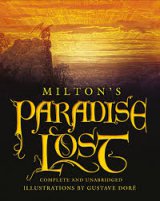Paradise Lost Page #21
Paradise Lost is an epic poem in blank verse by the 17th-century English poet John Milton. The first version, published in 1667, consisted of ten books with over ten thousand lines of verse. A second edition followed in 1674, arranged into twelve books with minor revisions throughout and a note on the versification.
To whom our general Ancestor repli’d. Daughter of God and Man, accomplisht Eve, Those have thir course to finish, round the Earth, By morrow Eevning, and from Land to Land In order, though to Nations yet unborn, Ministring light prepar’d, they set and rise; Least total darkness should by Night regaine Her old possession, and extinguish life In Nature and all things, which these soft fires Not only enlighten, but with kindly heate Of various influence foment and warme, Temper or nourish, or in part shed down Thir stellar vertue on all kinds that grow On Earth, made hereby apter to receive Perfection from the Suns more potent Ray. These then, though unbeheld in deep of night, Shine not in vain, nor think, though men were none, That heav’n would want spectators, God want praise; Millions of spiritual Creatures walk the Earth Unseen, both when we wake, and when we sleep: All these with ceasless praise his works behold Both day and night: how often from the steep Of echoing Hill or Thicket have we heard Celestial voices to the midnight air, Sole, or responsive each to others note Singing thir great Creator: oft in bands While they keep watch, or nightly rounding walk With Heav’nly touch of instrumental sounds In full harmonic number joind, thir songs Divide the night, and lift our thoughts to Heaven. Thus talking hand in hand alone they pass’d On to thir blissful Bower; it was a place Chos’n by the sovran Planter, when he fram’d All things to mans delightful use; the roofe Of thickest covert was inwoven shade Laurel and Mirtle, and what higher grew Of firm and fragrant leaf; on either side Acanthus, and each odorous bushie shrub Fenc’d up the verdant wall; each beauteous flour, Iris all hues, Roses, and Gessamin Rear’d high thir flourisht heads between, and wrought Mosaic; underfoot the Violet, Crocus, and Hyacinth with rich inlay Broiderd the ground, more colour’d then with stone Of costliest Emblem: other Creature here Beast, Bird, Insect, or Worm durst enter none; Such was thir awe of man. In shadier Bower More sacred and sequesterd, though but feignd, Pan or Silvanus never slept, nor Nymph, Nor Faunus haunted. Here in close recess With Flowers, Garlands, and sweet-smelling Herbs Espoused Eve deckt first her Nuptial Bed, And heav’nly Quires the Hymenaean sung, What day the genial Angel to our Sire Brought her in naked beauty more adorn’d, More lovely then Pandora, whom the Gods Endowd with all thir gifts, and O too like In sad event, when to the unwiser Son Of Japhet brought by Hermes, she ensnar’d Mankind with her faire looks, to be aveng’d On him who had stole Joves authentic fire. Thus at thir shadie Lodge arriv’d, both stood, Both turnd, and under op’n Skie ador’d The God that made both Skie, Air, Earth & Heav’n Which they beheld, the Moons resplendent Globe And starrie Pole: Thou also mad’st the Night, Maker Omnipotent, and thou the Day, Which we in our appointed work imployd Have finisht happie in our mutual help And mutual love, the Crown of all our bliss Ordain’d by thee, and this delicious place For us too large, where thy abundance wants Partakers, and uncropt falls to the ground. But thou hast promis’d from us two a Race To fill the Earth, who shall with us extoll Thy goodness infinite, both when we wake, And when we seek, as now, thy gift of sleep. This said unanimous, and other Rites Observing none, but adoration pure Which God likes best, into thir inmost bower Handed they went; and eas’d the putting off These troublesom disguises which wee wear, Strait side by side were laid, nor turnd I weene Adam from his fair Spouse, nor Eve the Rites Mysterious of connubial Love refus’d: Whatever Hypocrites austerely talk Of puritie and place and innocence, Defaming as impure what God declares Pure, and commands to som, leaves free to all. Our Maker bids increase, who bids abstain But our Destroyer, foe to God and Man? Haile wedded Love, mysterious Law, true source Of human ofspring, sole proprietie, In Paradise of all things common else. By thee adulterous lust was driv’n from men Among the bestial herds to raunge, by thee Founded in Reason, Loyal, Just, and Pure, Relations dear, and all the Charities Of Father, Son, and Brother first were known. Farr be it, that I should write thee sin or blame, Or think thee unbefitting holiest place, Perpetual Fountain of Domestic sweets, Whose Bed is undefil’d and chast pronounc’t, Present, or past, as Saints and Patriarchs us’d. Here Love his golden shafts imploies, here lights His constant Lamp, and waves his purple wings, Reigns here and revels; not in the bought smile Of Harlots, loveless, joyless, unindeard, Casual fruition, nor in Court Amours Mixt Dance, or wanton Mask, or Midnight Bal, Or Serenate, which the starv’d Lover sings To his proud fair, best quitted with disdain. These lulld by Nightingales imbraceing slept, And on thir naked limbs the flourie roof Showrd Roses, which the Morn repair’d. Sleep on, Blest pair; and O yet happiest if ye seek No happier state, and know to know no more. Now had night measur’d with her shaddowie Cone Half way up Hill this vast Sublunar Vault, And from thir Ivorie Port the Cherubim Forth issuing at th’ accustomd hour stood armd To thir night watches in warlike Parade, When Gabriel to his next in power thus spake. Uzziel, half these draw off, and coast the South With strictest watch; these other wheel the North, Our circuit meets full West. As flame they part Half wheeling to the Shield, half to the Spear. From these, two strong and suttle Spirits he calld That neer him stood, and gave them thus in charge. Ithuriel and Zephon, with wingd speed Search through this Garden, leav unsearcht no nook, But chiefly where those two fair Creatures Lodge, Now laid perhaps asleep secure of harme. This Eevning from the Sun’s decline arriv’d Who tells of som infernal Spirit seen Hitherward bent (who could have thought?) escap’d The barrs of Hell, on errand bad no doubt: Such where ye find, seise fast, and hither bring. So saying, on he led his radiant Files, Daz’ling the Moon; these to the Bower direct In search of whom they sought: him there they found Squat like a Toad, close at the eare of Eve; Assaying by his Devilish art to reach The Organs of her Fancie, and with them forge Illusions as he list, Phantasms and Dreams, Or if, inspiring venom, he might taint Th’ animal Spirits that from pure blood arise Like gentle breaths from Rivers pure, thence raise At least distemperd, discontented thoughts, Vain hopes, vain aimes, inordinate desires Blown up with high conceits ingendring pride. Him thus intent Ithuriel with his Spear Touch’d lightly; for no falshood can endure Touch of Celestial temper, but returns Of force to its own likeness: up he starts Discoverd and surpriz’d. As when a spark Lights on a heap of nitrous Powder, laid Fit for the Tun som Magazin to store Against a rumord Warr, the Smuttie graine With sudden blaze diffus’d, inflames the Aire: So started up in his own shape the Fiend. Back stept those two fair Angels half amaz’d So sudden to behold the grieslie King; Yet thus, unmovd with fear, accost him soon.
Translation
Translate and read this book in other languages:
Select another language:
- - Select -
- 简体中文 (Chinese - Simplified)
- 繁體中文 (Chinese - Traditional)
- Español (Spanish)
- Esperanto (Esperanto)
- 日本語 (Japanese)
- Português (Portuguese)
- Deutsch (German)
- العربية (Arabic)
- Français (French)
- Русский (Russian)
- ಕನ್ನಡ (Kannada)
- 한국어 (Korean)
- עברית (Hebrew)
- Gaeilge (Irish)
- Українська (Ukrainian)
- اردو (Urdu)
- Magyar (Hungarian)
- मानक हिन्दी (Hindi)
- Indonesia (Indonesian)
- Italiano (Italian)
- தமிழ் (Tamil)
- Türkçe (Turkish)
- తెలుగు (Telugu)
- ภาษาไทย (Thai)
- Tiếng Việt (Vietnamese)
- Čeština (Czech)
- Polski (Polish)
- Bahasa Indonesia (Indonesian)
- Românește (Romanian)
- Nederlands (Dutch)
- Ελληνικά (Greek)
- Latinum (Latin)
- Svenska (Swedish)
- Dansk (Danish)
- Suomi (Finnish)
- فارسی (Persian)
- ייִדיש (Yiddish)
- հայերեն (Armenian)
- Norsk (Norwegian)
- English (English)
Citation
Use the citation below to add this book to your bibliography:
Style:MLAChicagoAPA
"Paradise Lost Books." Literature.com. STANDS4 LLC, 2024. Web. 24 Nov. 2024. <https://www.literature.com/book/paradise_lost_101>.




Discuss this Paradise Lost book with the community:
Report Comment
We're doing our best to make sure our content is useful, accurate and safe.
If by any chance you spot an inappropriate comment while navigating through our website please use this form to let us know, and we'll take care of it shortly.
Attachment
You need to be logged in to favorite.
Log In